 Because Portugal is an abundant land of history and culture, what better way to emphasize this than to display some of the most recommended authors and their main works. I will indicate a dozen prominent writers, starting with six in this post and six in a future post.
Because Portugal is an abundant land of history and culture, what better way to emphasize this than to display some of the most recommended authors and their main works. I will indicate a dozen prominent writers, starting with six in this post and six in a future post.
Although the foundation of Portugal dates back to 1143, when it was officially recognized as a kingdom, having Afonso Henriques as its first king, the portuguese language evolved with time and truly became a mature and rich language in the 15th/16th century. This was the period of the portuguese maritime discoveries which lead to the expansion of the national language to various parts of the world, resulting in a rich travel literature.
Luis de Camões (circa 1524-1580)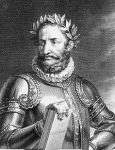
This also was the period when the greatest portuguese author of all times, Luis de Camões wrote “The Lusiads”, an epic poem of the Renaissance, inspired in the classic greek epic poems. “The Lusiads” (first edition published in 1572) is a historical image of portuguese culture, taking the Great Explorer Vasco da Gama the trip to the Indies via Southern Africa, as a central theme.
Camões is the first European artist to cross the equator, and his narrative reflects the freshness and fascination of that first encounter with Africa, India and the Far East. The poem’s twin symbols are the Cross and the Astrolabe, celebrating the turning point in mankind’s knowledge of the world, uniting the old map of the heavens with the newly discovered terrain on earth.
Fernando Pessoa (1888-1935)
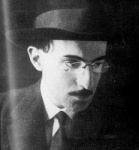 Born in Lisbon in 1888, Fernando Pessoa was brought up in Durban, South Africa. In 1905 he returned to Lisbon to study diplomacy, and continued to read and write in English. He published in 1918 35 Sonnets and in 1922 the three parts of his English Poems, all composed many years before. The only book in Portuguese published in his lifetime (although he left a profusion of unpublished and unfinished work, with over 25,000 pages manuscript and typed that have been housed in the Portuguese National Library since 1988) was Mensagem, a collection of poems on patriotic themes which won a consolation prize in a national competition. Pessoa also wrote under three main personas or ‘heteronyms’ (partial personalities who existed with some autonomy and distance from Pessoa himself and had very different views and experiences of life), Alberto Caeiro, Alvaro de Campos and Ricardo Reis, whose biographies he invented.
Born in Lisbon in 1888, Fernando Pessoa was brought up in Durban, South Africa. In 1905 he returned to Lisbon to study diplomacy, and continued to read and write in English. He published in 1918 35 Sonnets and in 1922 the three parts of his English Poems, all composed many years before. The only book in Portuguese published in his lifetime (although he left a profusion of unpublished and unfinished work, with over 25,000 pages manuscript and typed that have been housed in the Portuguese National Library since 1988) was Mensagem, a collection of poems on patriotic themes which won a consolation prize in a national competition. Pessoa also wrote under three main personas or ‘heteronyms’ (partial personalities who existed with some autonomy and distance from Pessoa himself and had very different views and experiences of life), Alberto Caeiro, Alvaro de Campos and Ricardo Reis, whose biographies he invented.
The most famous work of portuguese literature, translated to 37 languages was the Book of Disquiet, of Pessoa’s other heteronym, Bernardo Soares. The book is composed of fragments, the day-to-day jottings of a lonely and reclusive book-keeper in Lisbon, that records his observations of everyday life.
Fernando Pessoa has been called by some the greatest modern author in the history of Portugal.
José Saramago (1922-2010)
A poet, novelist, playwright and essayist born in Azinhaga in the province of Ribatejo, Nobel Laureate José Saramago made his international breakthrough in the 1980’s with his satirical novel Memorial do Convento. The novel is set in the first half of the 18th century. Saramago is the author of some 30 volumes of prose, poetry, drama and essays, and has won several major literary awards, in addition to the Nobel Prize.
Some his most known books are:
Blindness, this novel is about a city hit by an epidemic of blindness which spares no one. Authorities confine the blind to an empty mental hospital, but there the criminal element holds everyone captive, stealing food rations and raping women. There is one eyewitness to this nightmare who guides seven strangers-among them a boy with no mother, a girl with dark glasses, a dog of tears-through the barren streets. The story is a parable of loss and disorientation and an evocation of the horrors of the twentieth century.
Seeing is the follow up to Blindness and is once again focused on an unnamed city (Lisbon) and an unnamed populace. Whereas Blindness focused on the fragility of human nature, and how an epidemic of blindness brought about the reduction of humanity to animals, Seeing focuses on the fragility of democracy, where a state of emergency is declared after voters cast blank votes in an election.
The controversial book The Gospel According to Jesus Christ, is a fictional re-telling of Jesus Christ’s life, depicting him as a flawed, humanized character with passions and doubts. The book was withdrawn by the Portuguese Government from the European Literary Prize’s shortlist, claiming the work was religiously offensive.
Eça de Queiroz (1846-1900)
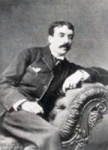 Novelist and short-story writer, Eça de Queirós introduced naturalism and realism to Portuguese literature. He is considered the major novelist of his generation. The French writer Emile Zola admired him greatly and said that Eça was “greater than Flaubert”.
Novelist and short-story writer, Eça de Queirós introduced naturalism and realism to Portuguese literature. He is considered the major novelist of his generation. The French writer Emile Zola admired him greatly and said that Eça was “greater than Flaubert”.
Some or his most known works are The Relic, The Maias and The Crime of Father Amaro.
The Relic was an episodic story of religious hypocrisy and truth. Its writing coincided with his marriage and drew on the travels with his wife’s brother to Egypt and the Near East
The Maias portrays the intense saga of the Maias, a very wealthy family, in a decadent period of portuguese history and through several generations. The novel focuses, through this setting, on the inevitability of fate; it also uses the family to send a tough criticism to society.
The Crime of Father Amaro is set in Leiria in the 1870s, and follows the love affair of young Father Amaro with nubile Amelia, and their interactions with Amelia’s mother, her atheist suitor, and her mother’s lover, the priest Canon Dias.
Almeida Garrett (1799-1854)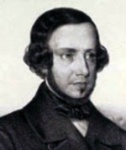
Poet, playwright, novelist and politician, Almeida Garrett is considered to be the introducer of the Romanticism in Portugal, with the epic poem Camões, based on the life of Luís de Camões. Almeida Garrett was generally considered the greatest of Portuguese dramatists, and was a significant poet and folklorist as well.
His most important work was the prose Travels in my homeland (“Viagens na minha terra”).
Antero de Quental (1842-1891)
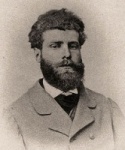 Antero de Quental was a portuguese poet, philosopher and thinker from the Azorean island of São Miguel, and stands at the head of modern Portuguese poetry after João de Deus.
Antero de Quental was a portuguese poet, philosopher and thinker from the Azorean island of São Miguel, and stands at the head of modern Portuguese poetry after João de Deus.
Antero began writing poetry while studying law at the University of Coimbra. His Odes Modernas (not translated to English), were well received, but it was his sonnets that attracted the most attention. Translated into German and Italian in his own lifetime, Antero’s sonnets became hugely popular, partly for their technical skill but probably more so for the ideas that inspired them and the gloomy ambiance that described them and made them somehow enchanting.
Throughout his life, Antero oscillated between pessimism and depression; afflicted with Bipolar Disorder, at the time of his last trip to Lisbon he was in a state of permanent depression, which was also accentuated by spinal disease. After one month, he travels once more to Ponta Delgada, and commits suicide on September 11, 1891, with two gunshots through the mouth.
Two of his books, translated to English are:
Sixty-four Sonnets, tr. Edgar Prestage, London, 1894 and Sonnets and Poems of Anthero de Quental, tr. S. Griswold Morley, Berkeley, 1822.
Image Credits: Wikipedia.org, Instituto Camões, JoseSaramago.org

{ 7 comments… read them below or add one }
Fernando Pessoa has been called by some the greatest modern author in the history of Portugal.
Correction: Fernando Pessoa has been called by some the four greatest modern authors in the history of Portugal.
Indeed we have other great modern authors in Portugal. Besides José Saramago (mentioned in this post), we can certainly mention António Lobo Antunes, Inês Pedrosa, Filipa Melo, Rui Zink, Teolinda Gersão, Agustina Bessa-Luís and Miguel Esteves Cardoso. Their works need to be better known. Maybe a suggestion for a next post. Thanks for your comment.
Indeed we have other great modern authors in Portugal. Besides José Saramago (mentioned in this post), we can also mention António Lobo Antunes, Inês Pedrosa, Filipa Melo, Rui Zink, Teolinda Gersão, Agustina Bessa-Luís and Miguel Esteves Cardoso. Their works need to be better known. Maybe a suggestion for a next post. Thanks for commenting.
There are also many Brazilian authors with important contributions to the Portuguese Language Literature, like Machado de Assis, Aloísio de Azevedo, Erico Verissimo, Euclides da Cunha, Guimarães Rosa, Graciliano Ramos, Raul Pompéia, Olavo Billac, Castro Alves, Cruz e Souza, Manuel Bandeira and many others.
This is a Place for Portugal !
Read the title : BEST IN PORTUGAL !
Also , it is mistery to me that , if there’s BRASILIAN authors , BRASILIAN Literature , Why there isn’t a BRASILIAN language ??!!
And you are a Fake english person , you Stupid , Motherfucker Brázuca !
Go to Hell !
I realize this is an old post, but it just had to be said: I’m pretty sure the OP was referring to Pessoa’s heteronyms, not other portuguese authors.
{ 1 trackback }